Photographs: Ina Fassbender/Reuters Prasanna D Zore in Miami
In the backdrop of the US mid-term elections slated for November 2, Rediff.com's Prasanna D Zore visits a small gathering of Muslims in Miami who despite feeling persecuted are fighting their battle in a peaceful way to break out of the stereotypes and prejudices that they experience in every day life post 9/11 America.
On October 29, Nidal -- a Palestinian settled in Miami for more than three decades -- was navigating through Miami's busy traffic when he heard on radio about a cargo plane being escorted by US Air Force fighter jets to New York on suspicion that they were laden with explosives.
"Let's hope there is no Muslim involvement," he thought aloud as he moved towards his home.
This was not the first time that Nidal and many other American Muslims like him had thought that way.
"We started thinking like this ever since 9/11 which led many Americans, though not all, to believe that all Muslims are terrorists," Nidal says betraying a sense of insecurity that many in his community share with him.
...
'The trend has always been against Muslims'
Image: Eugene Flinn with Faisal Kaleem (centre) and Nidal (Right)Photographs: Prasanna D Zore/Rediff.com
"Before that (9/11) our religion didn't matter much," Nidal reflects upon the kind of prejudice that a lot Muslims have been facing in the American society in the past decade.
"After yesterday's incident (October 29 when US authorities intercepted two packages coming from Yemen that supposedly contained explosives meant for synagogues in Chicago) some right-wingers might raise the anti-Muslim rhetoric especially at a time when voting is just right the corner," Nidal replies when asked if the latest terror incident will have political overtones.
Shabbir Motorwala from Mumbai, India, who moved to the US in 1972 as a student to study medicine and has settled ever since in Miami, strongly feels that the anti-Muslim feeling has picked up an unstoppable momentum. "However, all is not lost for the community," he quickly adds, expressing his faith in the people and ethos of the United States of America.
"The trend has always been against Muslims. But it will subside within a couple of more years," he believes.
Making a conscious effort to break stereotypes
Image: Khurrum Wahid of Emerge USAPhotographs: Prasanna D Zore/Rediff.com
Nidal's and Shabbir's voices, in a way, give you a sense of the situation that the Muslim community finds itself in, in America post 9/11.
And to get out of this rut some people in the community are making a conscious effort to break the stereotypes and prejudices that had gradually seeped into the way a lot of Americans look at Muslims today.
And leading the pack are people like Khurrum Wahid from Pakistan and Nidal.
Khurrum runs a law firm with offices in Miami and New York and help co-founded Emerge USA, a non-partisan organisation in 2006, to ensure political, constitutional and social privileges to the under-represented communities in the US, including Muslims.
Nidal, interestingly, also represents a number of people who have been arrested on charges of terror.
'It is a tough job but must engage people'
Photographs: David Moir/Reuters
As part of this organisation, he has been working hard in the Muslim community and encouraging them to come out and vote any candidate they think will lend them a patient ear and resolve to look into their problems.
As part of the get-out-the-vote programme Khurrum has arranged a small gathering of Muslims and has invited Eugene Flinn, a Democrat, who is running for the commissioner of Miami Dade County.
"We have a duty to work together to keep us safe and secure. We have to come out and convince the people that the Muslim community does not support terrorism. I know it's a tough job but the important thing is to engage with people who think otherwise and try to change their opinion about our community," Khurrum adds.
He gives some interesting insights that he and his team at Emerge USA gathered as part of a survey that tried to find out the perception of non-Muslim US citizens towards Muslims.
'80 pc Americans said they had negative opinion about Muslims'
Photographs: Rebecca Cook/Reuters
"The form had two questions. The first asked them if they knew any Muslims and the second one asked them about their opinion about Muslims. 80 per cent of those polled said that they had negative opinion about Muslims. Ironically, none amongst these 80 per cent answered the first question in the positive," Khurrum says.
The remaining 20 per cent said they knew Muslims and they had good opinion about the Muslims they knew.
This survey was sort of an eye opener for Khurrum and other like-minded people like him. It was this survey that made it clear to them that the best way to fight stereotypes and prejudices against Muslims was to find a method to get the non-Muslim American citizens often meet their Muslim counterparts or vice versa.
Efforts like these notwithstanding, a large section of the Muslim community feels that a section of the US media is not helping their cause.
'Please be a messenger of peace. We get so less of it'
Photographs: Ali Imam/Reuters
"What the US investigators found were not explosives but some electronic circuits and opinion is already being formed. Blogs and news reports have hate messages for Muslims and tomorrow if it turns out that it was a false alarm no newspaper will issue an apology," says Hamida (name changed on request), an Egyptian woman who works for Miami Dade County and had come to Nidal's house to meet Eugene as part of get-out-the-vote campaign.
Jane, another lady, a Christian, who was part of the congregation at Nidal's house knows the power of the media and repeatedly beseeches this correspondent to spread peace through our reports.
"You have come here to cover mid-term elections. Please be a messenger of peace because we get so less of it nowadays (in media reports). "I know if it bleeds, it reads," she says sarcastically about hyping terror reports in newspapers to get readers engaged.
"But one must show a sense of responsibility to verify reports before publishing them," she says pointing towards a campaign by some sections of the US media trying to whip up passions against Muslims.
'Doesn't a Muslim have the right to become the President?'
Image: Natasha, a volunteer for the Emerge USA groupPhotographs: Prasanna D Zore/Rediff.com
The other thing that many Muslims rue is the deliberate impression being floated around that they vote en masse for the Democrats and that's the reason that the US President is soft on terrorism.
"That's not entirely true. A lot of us do vote for Republicans. But that is beside the point, says Souhila El Hajj, a Lebanese, who was born and brought up in America.
"The US Constitution has given us the freedom to vote for whosoever we want to. A lot many people try to belittle President Obama's victory by claiming that he is a Muslim. So what even if he was to be a Muslim? Doesn't a Muslim have the right to become the President? This is United States of America, wake up!" says Souhila's 22-year-old daughter Natasha about all those flaying the US President for his Muslim middle name.
Natasha also volunteers for the Emerge USA group and has been engaged with the get-out-the-vote programme. "Earlier it wasn't so easy for us to get our fellow brethren come out and get involved with the election process," she says about the difficulty that volunteers like her faced she dresses in western outfits and was reprimanded by community elders to dress properly on a number of occasions while convincing others about the importance of involvement.
However, within a year, she managed to get as many as 780 Muslims register themselves as voters.'The hate is gonna grow'
Image: A group of women at Nidal's residencePhotographs: Prasanna D Zore/Rediff.com
"It's not that they were repulsive about the electoral process and I am not trying to say that only Muslims don't register themselves as voters. There are so many people who feel that their vote doesn't count. But we keep persisting to them about the importance of engagement and involvement. It will be only then that people will shed their prejudices and dislikes towards my community."
But reality is not as simple like Natasha feels according to Faisal Kaleem, a Pakistani, who teaches computer science at the Florida International University in Miami.
"The hate's gonna grow (after the October 29 incident)," says Faisal in a forthright way, "unless we stand up and fight these forces of hatred." "Such forces can be found everywhere. It's not just the Americans. There are so many in my community as well. For people like us we have to fight against both."
Though, he says, he doesn't feel like a Muslim when he is inside his university because the people there know him for his skills and not his religion the situation outside is a bit different.
'People will always try to instigate you but you need to be very patient'
Photographs: Marcos Brindicci/Reuters
"I was once heckled by a group of young Americans two years back after some terror alert who asked me to go back to my own country (this bunch of youngsters didn't know his nationality but taunted him because of his beard). They told me that I and the people of my community were a burden on the American taxpayer."
Faisal says that the youngsters wanted him to react and say something so that they could then further insult and abuse him.
"People will always try to instigate you but you need to be very patient. They do so for a political purpose and if you fall into their trap then the messengers of hatred will win," says Faisal sort of summarising (summarizing) the predicament faced by his community sin the post 9/11 America.

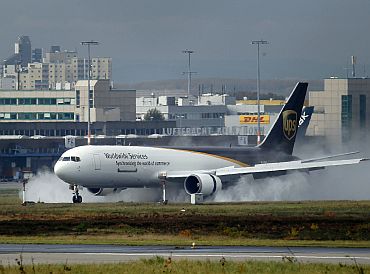
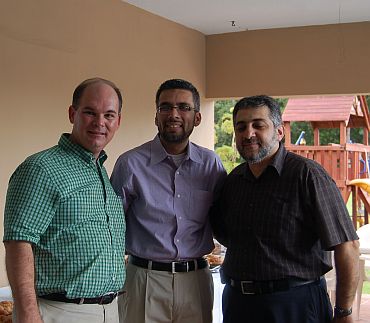
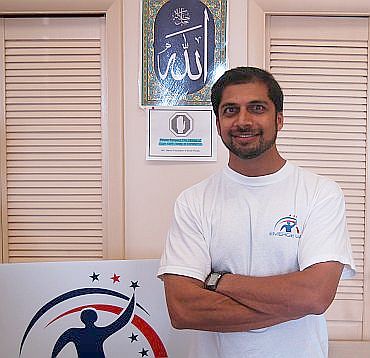
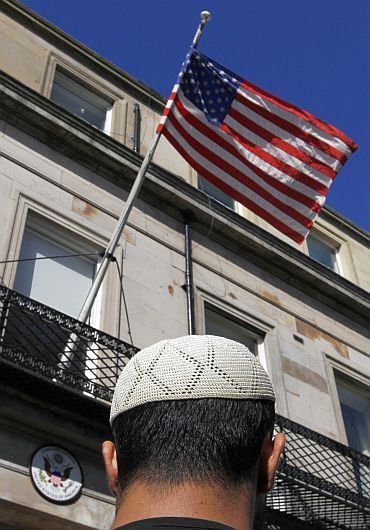
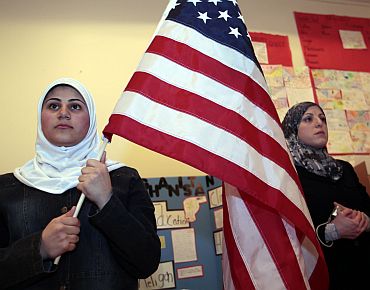
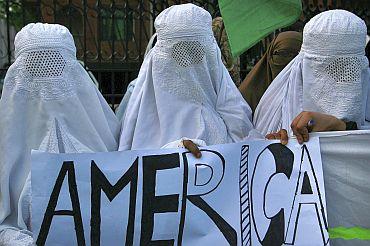
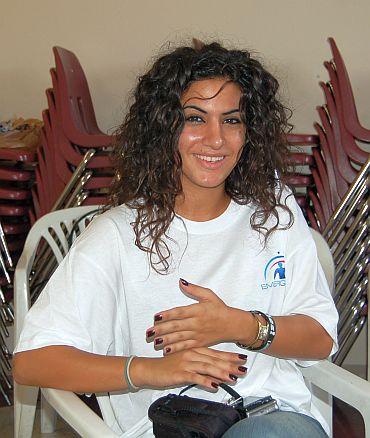

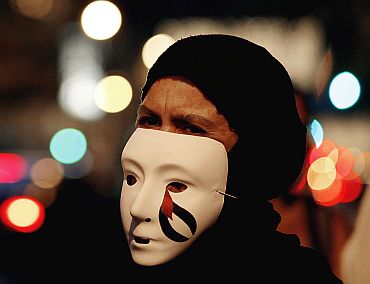
article